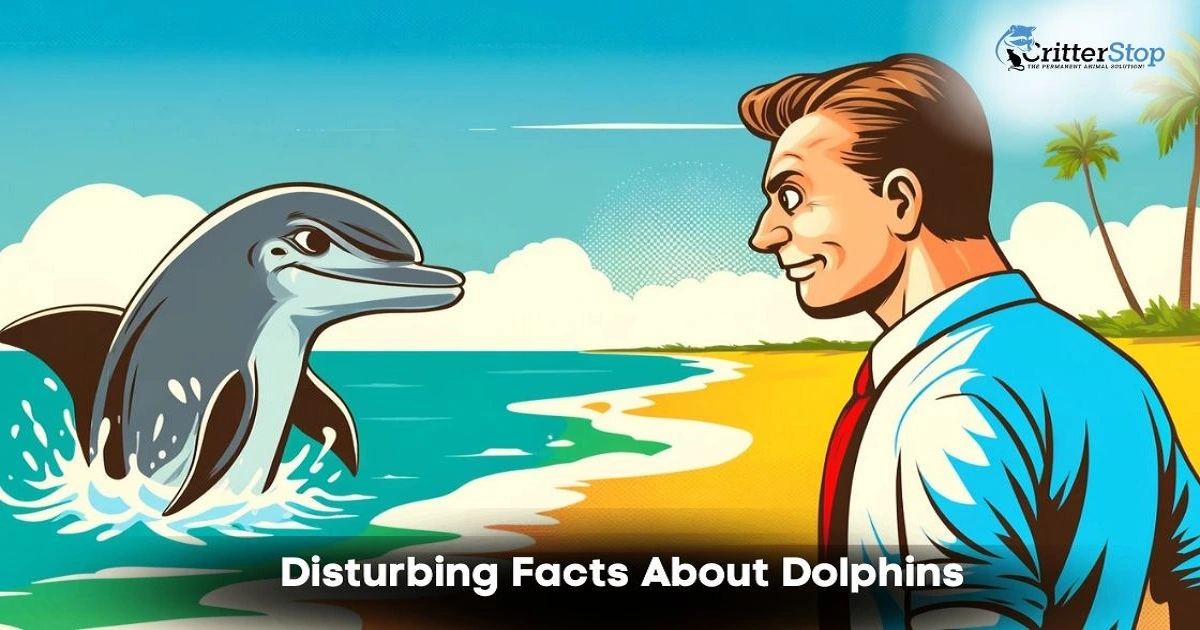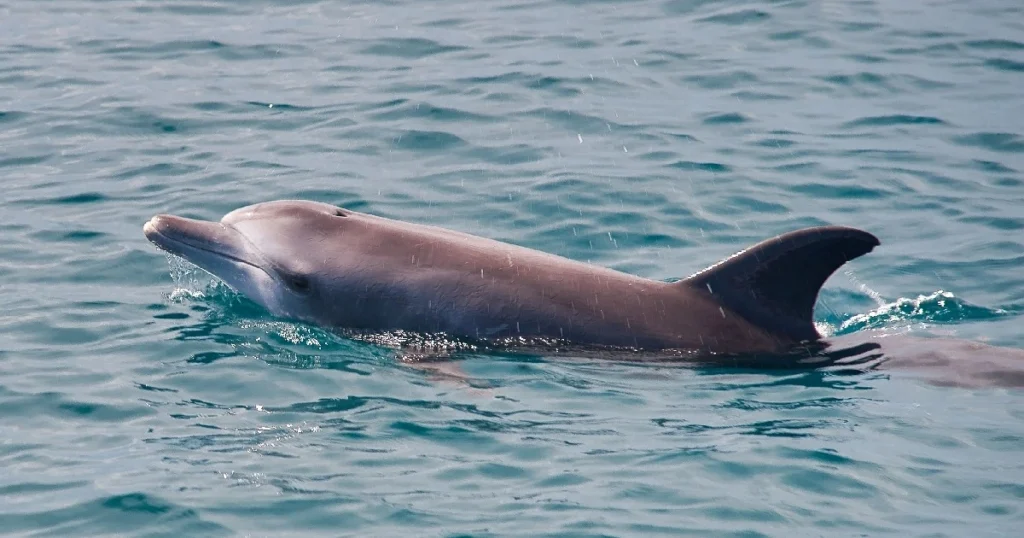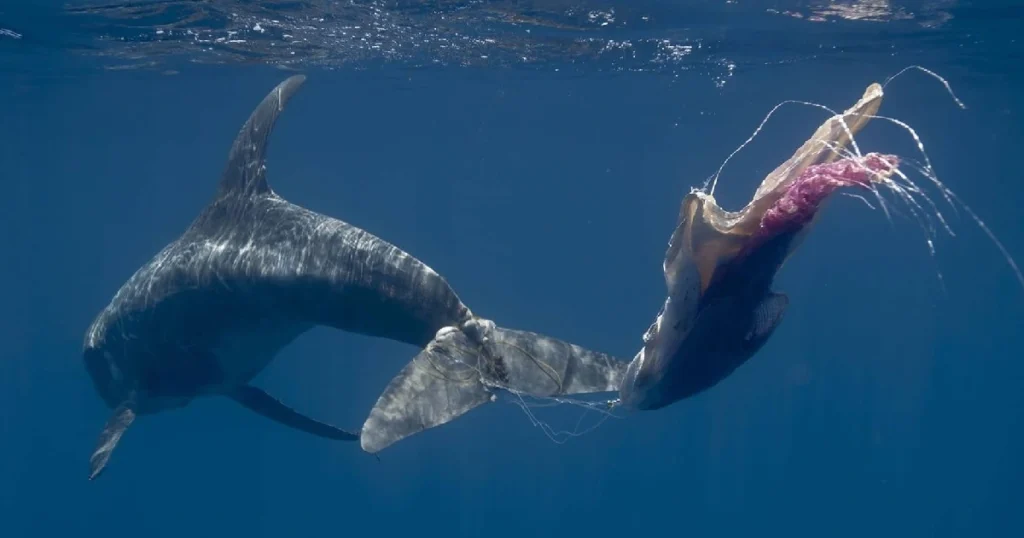
Dolphins, often portrayed as symbols of intelligence and grace, harbor a darker reality beneath their charming facade. While they captivate us with their playful antics and seemingly friendly nature, there are unsettling truths about these marine mammals that challenge our perceptions and highlight the complexities of their existence, so let’s explore the dark side of dolphins.
Contrary to their reputation for friendliness, dolphins can display aggressive behavior towards humans and other marine species. While interactions with humans are often positive, there have been documented cases of dolphins exhibiting aggressive tendencies, including biting, ramming, and even sexual assault. These incidents serve as a reminder that despite their intelligence, dolphins are wild animals with unpredictable behavior patterns.
In the animal kingdom, infanticide is a rare but not unheard-of phenomenon, and dolphins are no exception. Male dolphins have been observed engaging in acts of infanticide, particularly in cases where they seek to assert dominance within a social group or eliminate potential competition. This behavior highlights the ruthless nature of dolphin social dynamics and challenges the romanticized portrayal of these creatures.

Dolphin societies are characterized by intricate social structures, with individuals forming alliances and competing for status within their pods. These social hierarchies can have far-reaching implications for group dynamics, as dominant individuals wield influence over group activities and mating opportunities. However, this hierarchical system can also lead to conflict and aggression among pod members, underscoring the complexities of dolphin social behavior.
Despite forming strong social bonds within their pods, dolphins are not immune to infidelity. Mating strategies among dolphins often involve promiscuous behavior, with individuals engaging in extrapair copulations outside their established bonds.
This phenomenon is further complicated by mate guarding, where males actively prevent females from engaging with rival suitors. Such behaviors underscore the evolutionary pressures driving reproductive success in dolphin populations.
In addition to internal social dynamics, dolphins face many external threats from human activities and environmental degradation. Pollution, habitat loss, overfishing, and climate change pose significant challenges to dolphin populations worldwide, jeopardizing their long-term survival. These threats impact individual dolphins and disrupt the delicate balance of marine ecosystems in which they play a crucial role.
One of the most contentious issues surrounding dolphins is the practice of captivity for entertainment purposes. While marine parks and aquariums may portray captivity as a means of education and conservation, the reality is far bleaker.
Dolphins in captivity often suffer from stress, confinement-related ailments, and shortened lifespans compared to their wild counterparts. The confinement of these highly intelligent and social animals in artificial environments raises ethical concerns and highlights the need for alternative approaches to education and conservation.
Human activities, such as boating, fishing, and marine tourism, pose significant threats to dolphin populations. Collisions with boats can result in severe injuries or even fatalities for dolphins, while entanglement in fishing gear can lead to prolonged suffering and death.
Additionally, interactions with tourists, whether intentional or inadvertent, can disrupt natural behaviors and cause stress to dolphins in their habitats. These anthropogenic impacts underscore the importance of responsible marine stewardship and conservation efforts to mitigate harm to dolphin populations.
Dolphins possess remarkable cognitive abilities, including advanced problem-solving skills, self-awareness, and social cognition. Research has shown that dolphins exhibit complex behaviors such as cooperation, communication, and tool use, rivaling those of other highly intelligent species such as primates. Their cognitive complexity challenges traditional notions of intelligence and raises intriguing questions about the nature of consciousness and cognition in non-human animals.
Underwater noise pollution from human activities, such as shipping, seismic surveys, and military sonar, poses a significant threat to dolphin populations. Dolphins rely heavily on sound for communication, navigation, and prey detection, making them particularly vulnerable to disruptions caused by anthropogenic noise. Prolonged exposure to loud noises can result in hearing loss, stress, and behavioral changes in dolphins, ultimately impacting their survival and reproductive success.

Despite their widespread distribution across the world's oceans, many dolphin species face population declines due to anthropogenic threats. Habitat degradation, overfishing, pollution, and climate change contribute to losing critical habitats and declining dolphin prey availability.
Additionally, bycatch in fisheries and targeted hunting continue to pose direct threats to dolphin populations in certain regions. Urgent conservation action is needed to address these threats and safeguard the future of dolphins worldwide.
In light of the disturbing facts about dolphins outlined above, conservation efforts are more critical than ever to protect these iconic marine mammals. Conservation initiatives aimed at reducing anthropogenic threats, establishing marine protected areas, and promoting sustainable fishing practices are essential for ensuring the long-term survival of dolphin populations.
Public awareness and advocacy play a crucial role in advocating for protecting dolphins and their habitats, emphasizing the interconnectedness of marine ecosystems and the need for responsible stewardship.
Critter Stop has a fantastic reputation, and customer reviews online because it provides high-quality work and great customer service. If you're facing issues with wildlife or pests on your property, call Critter Stop at (214) 234-2616 for a free inspection and humane removal solutions.
Are you curious about the lesser-known aspects of dolphin behavior? Our FAQ section will help you uncover the truth about these enigmatic marine mammals.
Contrary to their friendly image, dolphins can exhibit aggressive behavior, engage in infanticide, and face threats from human activities such as captivity and environmental degradation.
Dolphins have a complex social hierarchy that can lead to aggression and conflict within their pods. They are also susceptible to negative impacts from human interactions and environmental disturbances.
While dolphins are often celebrated for their intelligence and playful nature, they can display aggressive behavior, engage in infanticide, and face numerous threats to their survival, highlighting a darker side to their existence.
The truth about dolphins is that they are complex creatures with both admirable qualities and disturbing behaviors. Understanding their true nature requires acknowledging the full spectrum of their behavior and challenges in their natural environment.
Scary facts about dolphins include their capacity for aggression, infanticide, susceptibility to environmental threats, and the ethical concerns surrounding their captivity for entertainment purposes. These facts shed light on the complexities of dolphin behavior and the conservation efforts needed to protect them.
Visit our Critter Library and learn more about our furry friends